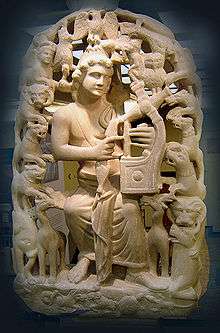Sousta
| Music of Greece | |
|---|---|
 | |
| General topics | |
| Genres | |
| Specific forms | |
| Media and performance | |
| Music awards |
|
| Music charts | |
| Music festivals | |
| Music media |
|
| Nationalistic and patriotic songs | |
| National anthem | "Hymn to Liberty" |
| Regional music | |
| Related areas | Cyprus, Pontus, Constantinople, South Italy |
| Regional styles |
|
Sousta (Greek: σούστα) is the name of a folk dance in Cyprus and Crete which is danced in Greece and generally in the Balkans. The music is generally played with a lyre (Cretan and Pontian) (or violin), laouto, and mandolin (or askomandoura).
There are elements of eroticism and courtship acted out in the dance, which is usually performed by pairs of men and women dancing opposite. Another form is where all the dancers in a row follow the first dancer who moves in complex patterns. Almost every island of Aegean has a sousta dance.
The origins of sousta come from the ancient pyrrhichios, a martial dance of Greece.[1]
See also
References
This article is issued from Wikipedia - version of the 9/21/2014. The text is available under the Creative Commons Attribution/Share Alike but additional terms may apply for the media files.